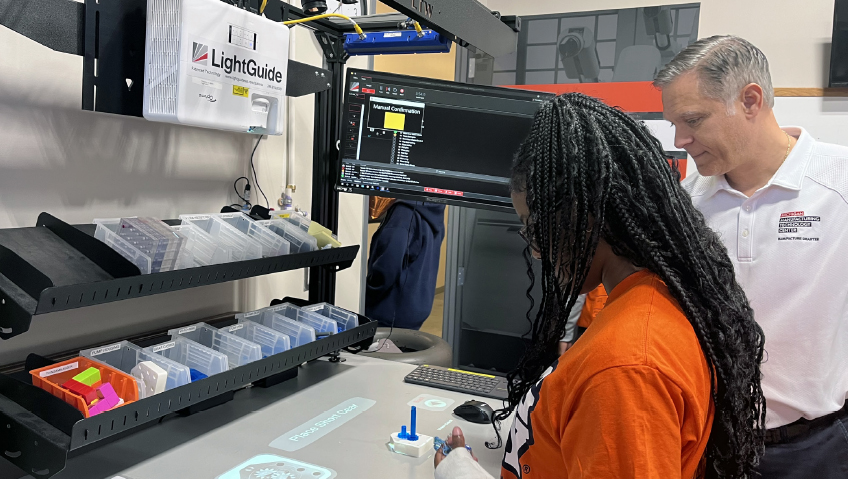The goal of the Michigan Manufacturing Technology Center (MMTC) is to offer Michigan manufacturers comprehensive consulting and training services to develop more effective business leaders, drive product and process innovation, assist with navigating through industry regulations, promote company-wide operational excellence, and foster creative strategies for business growth and greater profitability. Staff expertise is essential to the success of any endeavor, and MMTC’s team leverages their extensive industry knowledge to design specialized training programs, share knowledge, and implement strategies that drive success across all levels of an organization.
President Ingrid Tighe explains that there is currently significant demand for MMTC leadership training as companies struggle to maintain, attract, retain, and even find talent in manufacturing. “Workforce is what we do—our bread and butter,” says Tighe, so the organization takes these challenges on ably and with confidence.
Much of the time (nearly two years) since we last spoke has been spent making sure that MMTC is on top of the latest industry technologies, especially when it comes to newer and more pervasive tools like artificial intelligence (AI). Tighe says that as a lot of technology—like 3D printers or certain types of software—becomes less expensive, it is becoming much more ubiquitous.
MMTC is also focused on integrating the latest technology into its own activities to help teach and aid its clients, as well as ensuring it is integrating these technologies into manufacturing overall. MMTC needs to stay educated so it can educate its clients in turn.
The organization’s various divisions focus on specific aspects of industry, including cyber security and advanced technology, to better serve its clients. Food Business Development Manager John Spillson explains that the food processing aspect of MMTC continues to experience strong engagement as he and his department are always trying to bridge the gap so food processors understand that they are manufacturers at heart. MMTC’s food processing services are now “a key resource to organizations including snack food companies, bakeries, makers of nutritional supplements, and more,” he says.
Meanwhile, Lean Program Manager Josh Johnston—a newer hire from 2024—is helping to spearhead MMTC’s activities into the lean manufacturing space. He points out that lean manufacturing is not about removing aspects of manufacturing, as some may perceive it; rather, it is about helping companies do more with less. At its core, lean manufacturing provides relief to industry workers from potentially wasteful aspects of the work so they can maintain operational quality, as opposed to simply working faster and making mistakes along the way.
MMTC is coming off a tremendous year in 2024, in which it worked with over 2,000 companies across Michigan with great success. MMTC has seen a lot of interest in one of its company-specific food safety classes taught at Cherry Republic in Traverse City, Michigan, Spillson adds.
Johnston has noted similar success with MMTC’s 5S/Visual Management course, one of his favorites to teach. He says that it is amazing for him as an instructor to observe the transformation across the class as his students understand and use a new concept, a passion that is shared among MMTC’s educators.
AI, he says, is the big buzzword on everyone’s lips but should not be seen as a magic fix for every problem in manufacturing today. AI is like any other process optimization tool in that, if one inserts it into a bad process, it will only make that process faster—not better. MMTC will continue to rely on its lean principles and stable processes as AI use evolves.
AI itself is not necessarily anything new, says Johnston, but the prevalence of new products like ChatGPT has brought machine learning into the public consciousness. As such, it has become easier to use and more cost-effective, and can bring massive improvement to systems like quality and efficiency—but only as long as it allows human operators to do more in-depth problem solving or root analysis.
Johnston explains he has seen the abundance and adoption of AI up close, along with massive changes in both lean manufacturing and Industry 4.0 (the integration of new digital processes into manufacturing). He has already had to modify a class he teaches on how to leverage AI for manufacturers because of how quickly the technology is advancing. The pace of technology is brisk, so MMTC’s application of it to give its clients a competitive advantage against other manufacturers is imperative.
Spillson also views adopting AI as desirable in the food industry, especially in the face of challenges like understaffing, razor-thin cost margins, and logistics costs. Companies in the food space, for example, could benefit greatly from automating processes like pallet stacking or monitoring food safety and labelling requirements. AI processes, he says, have a place when it comes to understanding hazards and developing food safety plans. AI is “a definite advantage to the industry.”
Part of MMTC’s mandate going forward is to spread the message about technology, which can be intimidating for the small-to-medium manufacturers it serves. Tighe says that federal leaders, legislators, and state leaders have a keen awareness that operations like MMTC need to continue to onshore manufacturing. She notes that, as a nation, America is vulnerable in areas like pharmaceuticals and microchips, which are largely produced in China and have a low national presence. There is also much uncertainty pertaining to issues of food safety and tariffs and what this will all mean under the new administration.
Spillson says that MMTC is eager to do more than explore new and burgeoning aspects of the industry. There is so much that MMTC can do for these food processors thanks to its large web of nationwide resources and sister state organizations.
Johnston foresees 2025 as a year of ebb and flow—but with many opportunities. The issues surrounding electric and autonomous vehicles are parts of a very important conversation in a state like Michigan, with such a rich history in the automotive industry. He believes it is important to sit with clients about future-proofing their operations and making sure their portfolios and opportunities are diverse so they can compete on a global level.
He would, however, caution clients who want to implement AI systems into their workflows against investing too heavily because of how quickly new developments are coming online. It is better instead, he believes, to start small and scale as technology develops, learning from small implementations along the way, usually with existing tools that are using AI systems.
“We will be focused on continuing to be the trusted advisor to our manufacturers across the state,” says Tighe. MMTC will expand its operations, making sure to cover both rural and urban areas, while making its services more accessible through experimenting with both onsite and hybrid training models. She says that MMTC hopes to double and even triple the number of clients its services help within the next five years, so that MMTC can continue to be a trusted advisor to manufacturers in its home state who need a helping hand to perform at their best.






